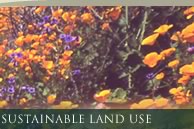EHL seeks improvement in Los Angeles County ecological ordinance
The Significant Ecological Areas Ordinance, which protects important biological resources, is being revised. EHL is working hard to improve a draft proposal.

The Los Angeles County General Plan identifies large swaths of land - Significant Ecological Areas or SEAs - for heightened scrutiny and protection due to ecological value. As part of an Update to the General Plan, the boundaries of SEAs are proposed for expansion. In addition, the ordinance which implements protective measures when development is proposed within SEAs is also being revised with an eye to reducing the uncertainty sometimes faced by developers.
Upon review of the draft ordinance, EHL identified several problems. As a result, it would not be effective in conserving the biological values in the County's remaining wild areas, and would also be a source of conflicts and uncertainties for development.
Most importantly, the draft ordinance neglected the primary step of avoiding sensitive resources through site design, in favor of pre-determined numerical ratios. There was no assurance that the “right” lands would be set aside or that basic preserve design principles would be followed. The draft also set the wrong limits on the progressive loss of SEA lands, only prohibiting further loss when near catastrophic harm was imminent. Finally, it did not produce an efficient process that integrated the ordinance with CEQA compliance and draft General Plan policies.
EHL also raised related planning issues, such as the need to align the intensity of development with the underlying resource values and the use of creative land planning to protect open space through "clustering" on least sensitive areas.
EHL submitted written comments, met with staff, and testified at a public hearing. Staff has been response to our concerns and we hope to see improvements for both biological protection and for permitting efficiency. Because the SEA system is the primary means to save Los Angeles County's remaining flora and fauna, EHL will continue to engage in the public process.


